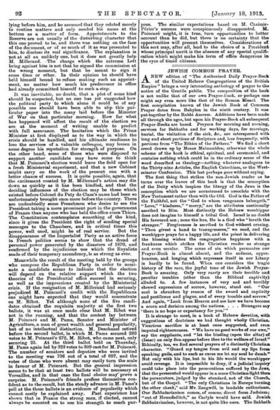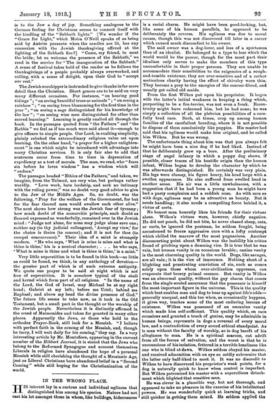JEWISH COMMON PRAYER.
ANEW edition of "The Authorized Daily Prayer-Book of the United Hebrew Congregations of the British Empire" brings a very interesting anthology of prayer to the notice of the Gentile public. The composition of the book is not unlike that of our own Prayer-Look, or perhaps one might say even more like that of the Roman Missal. The first compilation known of the Jewish Book of Common Prayer dates from Babylon in the ninth century. It was put together by the Rabbi Amram. Additions have been made all through the ages, but upon his Prayer-Book all subsequent Prayer-Books are based. Prayers for morning and evening, services for Sabbaths and for working days, for marriage, burial, the visitation of the sick, etc., are interspersed with long and short portions of Scripture and, less frequently, with portions from "The Ethics of the Fathers." We find a short creed drawn up by Moses Maimonides; otherwise the whole scheme of the book is ethical, spiritual, and ceremonial, and contains nothing which could be in the ordinary sense of the word described as theology—nothing whatever analo,gons to the Thirty-nine Articles, the English Catechism, or the Westminster Confession. This last perhaps goes without saying.
The first thing that strikes the non-Jewish reader as he turns over the leaves of this book is that the conception of the Deity which inspires the liturgy of the Jews is the conception which we are accustomed to associate with the New Testament rather than with the Old. God is the Father of the Faithful, not the "God to whom vengeance belongeth." "Love," "kindness," "mercy," are the attributes continually ascribed to Him. Most distinctly the Hebrew worshipper does not imagine to himself a tribal God. Israel is no doubt His favoured son ; none the less, He is a God who "loveth the stranger." Forgiveness is ascribed to God without ceasing. "Thou givest a hand to transgressors," we read, and the worshipper prays for a happy life, and the priest in delivering the blessing wishes the congregation happiness with a. frankness which strikes the Christian reader as strange and even secular. The sense of sin which permeates omPrayer-Book is almost absent, and the sadness, apprehension, and longing which expresses itself in our Litany is hardly to be found. When one considers the tragic history of the race, the joyful tone of the Jewish PrayerBook is amazing. Only very rarely are their terrible and peculiar troubles (other than the Biblical captivity) alluded to. A few instances of very sad and terribly shrewd expressions of son-ow, however, stand out. "Our soul is shrunken by reason of the sword and captivity and pestilence and plague, and of every trouble and sorrow.' And again, "Look from Heaven and see how we have become a scorn and derision among the nations. . . . Strangers say 'there is no hope or expectancy for you.?"
It is strange to meet, in a book of Hebrew devotion, with suggestions of doctrines we had thought wholly Christian. Vicarious sacrifice is at least once suggested, and even imputed righteousness. " We have no good works of our own," say the suppliants, and "let the binding (upon the altar) of (Isaac) an only Son appear before thee to the welfare of Israel." Ethically, too, we find several prayers of a distinctly Christian character. "Guard my tongue from evil and my lips from speak ing guile, and to such as curse me let my soul be dumb.' Not only with his lips, but in his life would the worshipper avoid revenge. It is impossible to deny, if a judicial inquiry could take place into the persecutions suffered by the Jews, that the persecuted would appear in a more Christian light than the persecutors, judged by the standard, not of the Church, but of the Gospel. "The only Christians in Europe turning the other cheek," said Mr. Zangwill, in laudable enthusiasm. Our Sabbatarianism comes, of course, direct from Judaism; "out of Houndsditch," as Carlyle would have said. Jewish Sabbatarianism, however, is not quite like ours. The Sabbath
is to the Jew a day of joy. Something analogous to the German feeling for Christmas seems to connect itself with the kindling of the "Sabbath lights." [We wonder if the "Grace for Light," which Moira O'Neill speaks of as being said by Antrim peasants when the candles are lit, has any connexion with the Jewish thanksgiving offered at the lighting of the Sabbath fire?] "Come, my friend, to meet the bride; let us welcome the presence of the Sabbath," we read in the service for "The inauguration of the Sabbath." A sense of festival takes hold of the reader as he follows the thanksgivings of a people probably always overworked, and calling, with a sense of delight, upon their God to "accept our rest."
The Jewishworshipper is instructed to give thanks in far more detail than the Christian. Short graces are to be said on very many different occasions. For instance, "on hearing good tidings " ; "on seeing beautiful trees or animals " ; "on seeing a rainbow " ; "on seeing trees blossoming for the first time in the year " ; "on seeing a sage distinguished for his knowledge of the law " ; "on seeing wise men distinguished for other than sacred learning." Learning is greatly exalted all through the book. In the passages quoted from "the Fathers" and "the Rabbis" we feel as if too much were said about it—enough to give offence to simple people. Our Lord, in exalting simplicity, plainly rebuked the extraordinary religious value set upon learning. On the other band, "a prayer for a higher enlightenment " is one which might be introduced with advantage into many Christian services. It is only fair also to add that sentences occur from time to time in deprecation of expediency as a test of morals. The man, we read, who "fears sin before he loves wisdom" has a wisdom which will " endure."
The passages headed "Ethics of the Fathers," and taken, we imagine, from the Talmud, are very wise, but perhaps rather worldly. "Love work, hate lordship, and seek no intimacy with the ruling power," was no doubt very good advice to give to the Jew of the Middle Ages. So, no doubt, was the following, "Pray for the welfare of the Government, for but for the fear thereof men would swallow each other alive." The next shows how strong was the Jewish fear of tyranny ; how much doubt of the monarchic principle, such doubt as Samuel expressed so wonderfully, remained ever in the Jewish mind "Judge not alone, for none may judge alone save one; neither say (to thy judicial colleagues), 'Accept my view,' for the choice is theirs (to concur); and it is not for thee (to compel concurrence)." Their idea, of a saint is strangely modern. "He who says, What is mine is mine and what is thine is thine,' his is a neutral character; . . . he who says, 'What is mine is thine and what is thine is thine,' is a saint."
Very little superstition is to be found in this book—as little as could be found, we think, in any anthology of devotion— the greater part of which is of such extreme antiquity. We quote one prayer to be said at night which is not free of superstition. It is somehow typical of the shell and kernel which form part of all religions. "In the name of the Lord, the God of Israel, may Michael be at my right band; Gabriel at my left; before me Uriel; behind me Raphael; and above my head the divine presence of God." The future life seems to take now, as it took in the Old Testament, but a small part in the thought or the worship of the Jewish people. Nevertheless it is distinctly affirmed in the creed of Maimonides and taken for granted in many other places. Apparently the Jews, or those who hold to the orthodox Prayer-Book, still look for a Messiah. "I believe with perfect faith in the coming of the Messiah, and, though he tarry, I will wait daily for his coming," they say. In a very interesting article by Mr. Montefiore, appearing in the current number of the Hibbert Journal, it is stated that the Jews who belong to the Reformed Synagogue and account themselves Liberals in religion have abandoned the hope of a personal Messiah while still cherishing the thought of a Messianic Age, just as Liberal Christians have abandoned belief in a "Second Coming" while still hoping for the Christianization of the world.







































 Previous page
Previous page